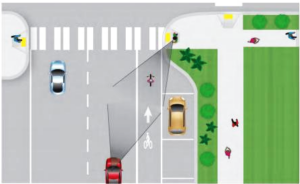Writing has a way of imposing discipline on a disorganized mind. Seeing one’s words on a page forces the kind of mental engagement that is necessary but infrequent in our scattered lives.
I recently read a local real estate listing for a house on the market in “Newton” Pennsylvania. It’s possible, I suppose. But that little burg in the northern part of the state is a long way from the thriving town of Newtown Pennsylvania near me. What kind of agent can’t correctly name the town close to the home they want to sell? Writing has a way of imposing discipline on a disorganized mind. Seeing one’s words on a page forces the kind of mental engagement that is necessary but infrequent in our scattered lives.
An extended statement provides space to dwell on necessary complexities, to make a case with sufficient amplification and evidence, and possibly guide readers towards an action they have been reluctant to take. Good writing is coherent, interesting, and expansive. Whether we’re working on an essay, report, or letter, we know when we need to make the most of the ideas we have laid down. This is a ritual for high school students working on the perfect essay to a selective college, an employee on deadline to finish a report that will be seen by peers and management, or the citizen making a case to reluctant officials or neighbors.

If it were only easy. Writing is one of those skills that we never fully master. As words take their place in sentences, they give off non-uniform impressions that it can easily drift beyond what you intended to say. This simple fact makes writing a challenge, and more so in an era when the tools of composition—everything from self-correcting word processing to A.I. attempts—can make it appear that things are under control. But you can bet that, at some point, any first draft of writing will go off the rails. What is less certain is whether you will put in the time and effort to correct the confused ideas and the mechanics of a first pass on a subject.
In her useful book for writers, Bird By Bird, Anne Lamott declares unequivocally that every writer needs to get past the “shitty first draft.” It’s her not-so-gentle way to remind budding scribes to take at least several more passes over the prose they are usually too eager to accept as sufficiently worked out.
Part of the problem with settling on a first draft of any extended statement is that it reflects the likely fact that we aren’t yet clear about what we know or believe. Clarity comes when the theme of a piece begins to reveal itself, sometimes late in the process. Ideas worked out on the page will force a writer to reckon with a concrete expression of what they mean. The work is paying off when a second look lets a writer see that they have not yet said what they want. Writing has a way of imposing discipline on a disorganized mind.
I suspect I’m not the only one to notice that after a day or so, my first drafts look dead on arrival. They are usually confusing, wordy, and both over-written and underdeveloped. Having discovered what I really think, successive drafts refine the process. With time it usually becomes clear that the points I wanted to make can be said with greater economy and clarity.
A writer also discovers that the act of revising is enough to set the mind off on its own extended tour of the landscape that is being surveyed. This is a curious phenomenon. It turns out that not all writing happens when a person is formally on task. Better ways to make points force their way into our consciousness even when we move on to other things, like walking or trying to sleep. The left hemisphere of the brain thinks in language, and it’s sometimes only too happy to stay on the case longer than the rest of our mind.
I think I have only known one colleague who wrote and spoke in more or less “finished” prose. This historian was a phenomenon to listen to: a good scholar, amazingly fluent and a gifted lecturer. It was a relief when he moved to another campus.
A few specific suggestions:
-Do not multi-task and write. Give the high order process of invention your full attention.
-Work in a quiet spot. Give your mind the chance to focus on your ideas.
-Write when you are at your best: it may be early morning or late at night, or fully caffeinated.
-Use editing tools or only after you have worked out most of the bugs.
-Read your work out loud or ask MSWord (Review/Read Aloud) to do it for you. You will be surprised to discover what doesn’t scan right.
-Work until you feel like you have taken ownership of your words and ideas.
![]()







